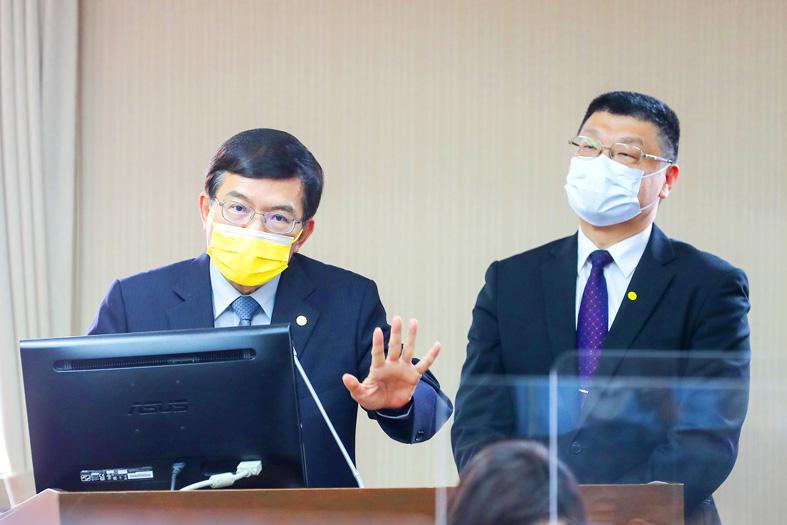Minister of Transportation and Communications Wang Kwo-tsai (王國材) yesterday told Taiwan Railways Administration (TRA) employees that their salaries and benefits would remain in place after the agency is transformed into a state-run corporation.
TRA employees are civil servants recruited through a government railway service exam.
Once a state-run railway company is established, each employee would have five years to consider whether to continue being a civil servant or become a company employee, Wang told lawmakers of the legislature’s Transportation Committee.

Photo: CNA
The dual-track system would ensure that employee rights are protected, and gives the railway operator the room to hire top-notch railway service professionals.
Wang made the remarks as the committee yesterday reviewed amendments to the Railway Act (鐵路法) proposed by lawmakers and the Ministry of Transportation and Communications, which would give the nation’s largest railway operator more flexibility to manage its properties. The committee is to continue its meeting tomorrow.
A committee hearing scheduled for Thursday is to discuss draft statutes governing the establishment of a state-run Taiwan Railway Corp.
The Taiwan Railway Labor Union said that the committee should not review the draft statute until ministry officials have negotiated terms with the union.
It also said that union members would protest at the Legislative Yuan tomorrow against what it considers to be an arbitrary move from the transportation ministry.
The draft statute is flawed, the union said.
It fails to address safety issues facing the TRA, and does not guarantee that the salary adjustment mechanism of the civil servants and military personnel would remain after the formation of the corporation, it said.
Recruitment exams would be administered by the company rather than the Examination Yuan, the union said, adding that the government might not consider the railway workers to be civil servants after the transition.
Workers would be required to vacate TRA dormitories after the company is established, without any improvement in salary or benefits, the union said.
Wang told reporters on the sidelines of the committee meeting that the union “is clearly out of the loop,” adding that the ministry plans to provide details of the draft statute on Thursday.
“We are not adding regulations on railway safety reform in the draft statute, because we are conducting the reform now, and it is an ongoing matter,” Wang said. “State-run company employees enjoy the same benefits as civil servants. This year, they received a 4 percent pay raise. This part does not need to be highlighted in the draft statute either.”
TRA employees cannot be evicted from dormitories, he said, adding that the Examination Yuan would continue to authorize the TRA to hold railway recruitment examinations.
All workers in the state-run railway company would have opportunities to receive raises and better benefits, whether they maintain the status of a civil servant or are hired after a company is established.
Democratic Progressive Party Legislator Liu Shyh-fang (劉世芳) said that the ministry is responsible for explaining to TRA employees the benefits and drawbacks of being a civil servant or a state-run company employee.
The ministry should disclose to TRA workers what it would do with TRA’s accumulated debts of more than NT$140 billion (US$4.91 billion), “using words that they can understand,” Liu said.

Taiwanese were praised for their composure after a video filmed by Taiwanese tourists capturing the moment a magnitude 7.5 earthquake struck Japan’s Aomori Prefecture went viral on social media. The video shows a hotel room shaking violently amid Monday’s quake, with objects falling to the ground. Two Taiwanese began filming with their mobile phones, while two others held the sides of a TV to prevent it from falling. When the shaking stopped, the pair calmly took down the TV and laid it flat on a tatami mat, the video shows. The video also captured the group talking about the safety of their companions bathing

US climber Alex Honnold is to attempt to scale Taipei 101 without a rope and harness in a live Netflix special on Jan. 24, the streaming platform announced on Wednesday. Accounting for the time difference, the two-hour broadcast of Honnold’s climb, called Skyscraper Live, is to air on Jan. 23 in the US, Netflix said in a statement. Honnold, 40, was the first person ever to free solo climb the 900m El Capitan rock formation in Yosemite National Park — a feat that was recorded and later made into the 2018 documentary film Free Solo. Netflix previewed Skyscraper Live in October, after videos

Starting on Jan. 1, YouBike riders must have insurance to use the service, and a six-month trial of NT$5 coupons under certain conditions would be implemented to balance bike shortages, a joint statement from transportation departments across Taipei, New Taipei City and Taoyuan announced yesterday. The rental bike system operator said that coupons would be offered to riders to rent bikes from full stations, for riders who take out an electric-assisted bike from a full station, and for riders who return a bike to an empty station. All riders with YouBike accounts are automatically eligible for the program, and each membership account

A classified Pentagon-produced, multiyear assessment — the Overmatch brief — highlighted unreported Chinese capabilities to destroy US military assets and identified US supply chain choke points, painting a disturbing picture of waning US military might, a New York Times editorial published on Monday said. US Secretary of Defense Pete Hegseth’s comments in November last year that “we lose every time” in Pentagon-conducted war games pitting the US against China further highlighted the uncertainty about the US’ capability to intervene in the event of a Chinese invasion of Taiwan. “It shows the Pentagon’s overreliance on expensive, vulnerable weapons as adversaries field cheap, technologically